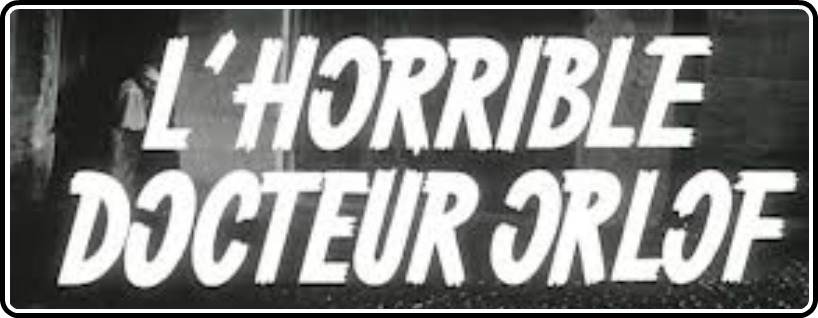While he is ultimately known for his various takes on such legendary characters as Dracula and Frankenstein (at least with regards to his horror work), director Jess Franco has himself bred at least one intriguing character all his own.
Known as Dr. Orlof (or Orloff, depending on the film, Franco was never fond of really sticking to one name, even if it’s a simple spelling change), the character is still relegated to primarily the cult genre world, but is one of the most iconic characters ever touched by the late Spanish shockteur.
Kino Lorber subsidiary Redemption Films is releasing a new Blu-ray of Franco’s Orlof-starring masterpiece The Awful Dr. Orlof and while one may not be familiar with this cult icon, hopefully this Blu-ray, if it does anything, will hook a new generation of viewers not only on a really great character, but a truly intriguing filmmaker in Jess Franco himself.
Often considered to be the first actual horror film ever produced in Franco’s native Spain, the film would mark the first real time the film world took notice of Franco as a filmmaker. Following the story of the titular surgeon who attempts to graft skin onto his disfigured daughter’s face by luring various women to his home, a brooding castle ripped right out of any Hammer horror picture, only to operate on them in various experiments. Along with a blind minion named Morpho, The Awful Dr. Orlof is one of Franco’s most atmospheric, and also genuinely subdued motion pictures. It’s also one of his best.
Steeped in the type of atmosphere one would find in films ranging from the aforementioned Hammer pictures to classic Universal monster films, the film is a rather superb example of just how intriguing a director Franco truly was. Far better known for the surreal erotic thrillers that a film like Nightmares Come At Night proves Franco a master at, this is a brooding thriller that is fueled by a Gothic atmosphere bred by everything from the set and costume design to the stunning cinematography from Godofredo Pacheco. Franco’s film is admittedly rudimentary and you can ostensibly sense Franco finding his legs as he went throughout the production, but his use of light and the black and white photography to craft a genuinely tense picture is rather enthralling. There is a haze to the film that really fits the mood and atmosphere, and while this is very much a tone piece riffing on your run-of-the-mill horror premise, Franco’s film is an exciting ode to classic Gothic aesthetics.
Performance wise, the film brazenly relies on one performance, that of Howard Vernon as Orlof himself. A vicious scientist hell bent on curing his daughter, Vernon is rather great here in what is ostensibly a difficult role to make his own. It’s ostensibly the type of grindhouse picture that is still shown around the world at midnight screenings, and while that description may put in the mind visions of camp-filled cheesing and cartoonish over the top actions, Vernon’s performance is far more thoughtful and plaintive, positing a lead that is both mean and indelibly tragic. The other various performances here, including turns from the likes of Diana Lorys (easily the best known of the supporting cast) and Perla Cristal, are fine, but not all that intriguing, save for Lorys who gives in easily the best performance from the second tier cast. It’s a find turn and her face is a perfect place to portray this type of terror and horror. It’s a fine horror/genre performance, and one that pairs up perfectly opposite Vernon’s rather perfect performance.
Ultimately thrilling, yet cliché-ridden, Franco’s film is an auspicious start, of sorts, to a career that would run over 200 films and 50 years. It’s not his first feature film, but it definitely feels like a film from a director trying to flex his cinematic muscle for the first time. His fourth feature film (one of three released in 1962), the film is an early picture from a deeply influential genre filmmaker (just look at this year’s Kiss Of The Damned to see just what type of influence the filmmaker has had), and thankfully, Kino’s Blu-ray gives it the justice it so rightly deserves.
The restoration here is fantastic, with the transfer really amping up the black and white photography, making the atmosphere all the more potent. Video Watchdog’s Tim Lucas is, again, on the commentary track here, waxing poetic about Franco, this film and its place in the filmmaker’s career, which itself pairs perfectly with the various video pieces looking at the making of the film, the director himself and even an homage to Franco from Daniel Gouyette. Toss in a rather solid English dub track, and you have a Blu-ray that really does this solid, if cliché, Gothic terror flick a good service. Hopefully this won’t be looked over by the public. Fingers are crossed.



